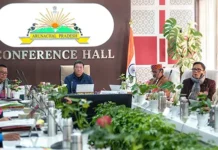NEW DELHI, 11 Aug: Expressing anguish over the manner in which women were subjected to grave atrocities in Manipur, the Supreme Court has said that mobs use sexual violence to send a message of subordination to the other community and the state is bound to stop this.
The court also asked the three-member committee of retired judges constituted by it to inquire into the nature of violence against women that occurred in Manipur from 4 May.
A bench headed by Chief Justice DY Chandrachud said that subjecting women to sexual crimes and violence is completely unacceptable and constitutes a grave violation of the constitutional values of dignity, personal liberty and autonomy.
“Mobs commonly resort to violence against women for multiple reasons, including the fact that they may escape punishment for their crimes if they are a member of a larger group.
“In time of sectarian violence, mobs use sexual violence to send a message of subordination to the community that the victims or survivors hail from.
“Such visceral violence against women during conflict is nothing but an atrocity. It is the bounden duty of the state – its foremost duty, even – to prevent people from committing such reprehensible violence and to protect those whom the violence targets,” the bench, also comprising Justices JB Pardiwala and Manoj Misra, said in its 7 August order, which was uploaded on Thursday night.
More than 160 people have been killed and several hundred injured since ethnic violence first broke out in the state on 3 May.
The top court further said that it’s crucial for the police to identify and arrest the accused person expeditiously because they may be required for the completion of investigation.
“Further, the accused may attempt to tamper with or destroy the evidence, intimidate witnesses, and flee from the place of the crime,” the bench said, adding significant delay in the identification and arrest of the accused for no reason at all cannot be countenanced by it.
Observing that sectarian strife has also led to large-scale destruction of residential properties and places of worship, the apex court said it is duty bound to step in while performing its plain constitutional obligation.
“This court is also of the opinion that its intervention will be a step towards the guarantee of non-repetition that victims of such crimes are entitled to,” it said.
“The remedies which have been granted are those which the court feels will be even-handed across all communities and do justice to all those who have been injured (in any manner) by the sectarian violence.
“The victims of violence must receive remedial measures, irrespective of their community. Likewise, the perpetrators of violence must be held accountable, irrespective of the source of violence,” it said.
The top court said there are serious allegations, including witness statements, indicating that the law-enforcing machinery has been inept in controlling the violence and, in certain situations, colluded with the perpetrators.
“Absent a proper investigation, this court will not enter a finding of fact on these allegations. But, at the very least, such allegations require an objective fact-finding to be conducted.
“Those who are responsible for a breach of public duty must equally be brought to account, regardless of their rank, position, or post,” it said.
The apex court said that every officer or employee of the state who is guilty not only of dereliction of constitutional and official duties but of colluding with perpetrators to become offenders themselves must be held accountable without fail.
“This is the promise of justice that the Constitution demands from this court and from all branches of the state,” it said.
In order to ensure that the violence ceases, the perpetrators of violence are punished and the faith and confidence of the community in the justice system is restored, the top court constituted a committee of three former high court judges, including Justice Gita Mittal, former chief justice of Jammu & Kashmir High Court, Justice Shalini Phansalkar Joshi, former judge of the Bombay High Court and Justice Asha Menon, former judge of the Delhi High Court.
The apex court said that the mandate of the three-member committee would be to enquire into the nature of violence against women that occurred in Manipur from 4 May from all available sources, including personal meetings with survivors, members of families of survivors, local/community representatives, authorities in charge of relief camps and the FIRs lodged as well as media reports.
The committee will also submit a report to it on the steps required to meet the needs of the survivors, including measures for dealing with rape trauma, providing social, economic, and psychological support, relief and rehabilitation in a time bound manner, the bench said.
Directing that the process of investigation shall be monitored by the apex court, the bench also appointed former Maharashtra DGP Dattatray Padsalgikar to supervise the investigation by the CBI into the FIRs transferred to it and the investigation by the investigative machinery of the state into the remaining FIRs.
“For the purpose of ensuring proper investigation of the FIRs which are transferred to the CBI, the union ministry of home affairs shall place at the disposal of the CBI five officers drawn from the states of Rajasthan, Madhya Pradesh, Jharkhand, Odisha and NCT of Delhi at least of the rank of deputy superintendent of police.
“At least one of these five officers shall be a woman. For this purpose, the directors general of police of the above states shall nominate an officer at least of the rank of deputy superintendent of police for deputation to the CBI,” it said.
On deputation, the officers shall perform their functions under the overall structure of the CBI and submit periodical information and reports as may be required, it said.
“Dattatray Padsalgikar is also requested to investigate the allegations that certain police officers colluded with perpetrators of violence (including sexual violence) during the conflict in Manipur.
“The union government and the state government shall provide any assistance required in order to carry out this investigation. The findings shall be submitted to this court in the form of a report,” the bench said. (PTI)




